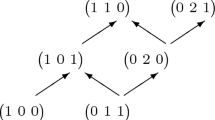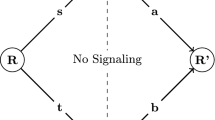Abstract
The well-known quantization schemes for two-player nonzero-sum games are Eisert–Wilkens–Lewenstein scheme and Marinatto–Weber scheme. In this work, we establish the connection between the two schemes from the perspective of quantum circuits. Further, we provide the correspondence between any game quantization schemes and the CNOT complexity, where CNOT complexity is up to the local unitary operations. While CNOT complexity is known to be useful in the analysis of universal quantum circuit, in this work, we find its applicability in quantum game theory.

Similar content being viewed by others
Explore related subjects
Discover the latest articles, news and stories from top researchers in related subjects.References
Nash, J.: Equilibrium points in n- person game. Proc. Natl. Acad. Sci. 36, 48–49 (1950)
von Neumann, J., Morgenstern, O.: Theory of Games and Economic Behavior. Wiley, New York (1967)
Meyer, D.A.: Quantum strategies. Phys. Rev. Lett. 82, 1052–1055 (1999)
Meyer, A.: Quantum games and quantum algorithms. In: Lomonaco Jr., S.J., Brandt, H.E. (eds.) AMS Contemporary Mathematics, Volume: Quantum Computation and Quantum Information Science, vol. 305. American Mathematical Society, Providence (2002)
Eisert, J., Wilkens, M., Lewenstein, M.: Quantum games and quantum strategies. Phys. Rev. Lett. 83, 3077–3080 (1999)
Marinatto, L., Weber, T.: A quantum approach to static games of complete information. Phys. Letts. A. 272, 291–303 (2000)
Nawaz, A., Toor, A.H.: Generalized quantization scheme for two-person non-zero sum games. J. Phys. A. 37, 11457–11464 (2004)
Iqbal, A.: Studies in the theory of quantum games. Ph.D. thesis, Quaid-I-Azam University, Islamabad, Pakistan (2004). arXiv:quant-ph/0503176
Flitney, A.P.: Aspects of quantum game theory. Ph.D. thesis, University of Adelaide, Adelaide, Australia, January, 2005. https://digital.library.adelaide.edu.au/dspace/bitstream/2440/37958/10/02whole.pdf
Nawaz, A.: The generalized quantization schemes for games and its application to quantum information. Ph.D. thesis, Quaid-I-Azam University, Islamabad, Pakistan (2007). arXiv:quant-ph/1012.1933
Flitney, A.P., Abbott, D.: An introduction to quantum game theory. Fluct. Noise Lett. 2, R175–R187 (2002)
Piotrowski, E.W., Sladkowski, J.: An invitation to quantum game theory. Int. J. Theor. Phys. 42(5), 1089–1099 (2003)
Guo, H., Zhang, J., Koehler, G.J.: A survey of quantum games. Decis. Support Syst. 46, 318–332 (2008)
Khan, F.S., Phoenix, S.J.D.: Gaming the quantum. Quantum Inf. Comput. 13(3–4), 231–244 (2013)
Khan, F.S., Phoenix, S.J.D.: Mini-maximizing two qubit quantum computations. Quantum Inf. Process. 12(12), 3807–3819 (2013)
Rezakhani, A.T.: Characterization of two-qubit perfect entanglers. Phys. Rev. A 70, 052313 (2004)
Vidal, G., Dawson, C.M.: Universal quantum circuit for two-qubit transformations with three controlled-NOT gates. Phys. Rev. A 69, R010301 (2004)
Makhlin, Y.: Nonlocal properties of two-qubit gates and mixed states, and the optimization of quantum computations. Quantum Inf. Proc. 1, 243–252 (2002)
Zhang, J., Vala, J., Whaley, K.B., Sastry, S.: Geometric theory of nonlocal two-qubit operations. Phys. Rev. A 67, 042313 (2003)
Shende, V.V., Bullock, S.S., Markov, I.L.: Recognizing small-circuit structure in two-qubit operators. Phys. Rev. A 70, 012310 (2004)
Vatan, F., Williams, C.: Optimal quantum circuits for general two-qubit gates. Phys. Rev. A 69, 032315 (2004)
Balakrishnan, S., Sankaranarayanan, R.: Entangling power and local invariants of two-qubit gates. Phys. Rev. A 82, 034301 (2010)
Balakrishnan, S., Sankaranarayanan, R.: Operator-Schmidt decomposition and the geometrical edges of two-qubit gates. Quantum Inf. Process. 10(4), 449–461 (2011)
Situ, H., Huang, Z.: Relativistic quantum Bayesian game under decoherence. Int. J. Theor. Phys. 55, 2354–2363 (2016)
Deng, X., Deng, Y., Liu, Q., Wang, Z.: Quantum games of opinion formation based on the Marinatto–Weber quantum game scheme. Eur. Phys. Lett. 114, 50012 (2016)
Deng, X., Deng, Y., Liu, Q., Chang, S., Wang, X.: A quantum extension to inspection game. Eur. Phys. J. B 89, 162 (2016)
Coffey, M.W., Deiotte, R., Semi, T.: Comment on “Universal quantum circuit for two-qubit transformations with three controlled-NOT gates” and “Recognizing small-circuit structure in two-qubit operators”. Phys. Rev. A 77, 066301 (2008)
Coffey, M.W., Deiotte, R.: Exact canonical decomposition of two-qubit operators in terms of CNOT. Quantum Inf. Process. 9, 681–691 (2010)
Coffey, M.W., Deiotte, R.: Relation of operator Schmidt decomposition and CNOT complexity. Quantum Inf. Process. 7, 117–124 (2008)
Author information
Authors and Affiliations
Corresponding author
Rights and permissions
About this article
Cite this article
Vijayakrishnan, V., Balakrishnan, S. Correspondence between quantization schemes for two-player nonzero-sum games and CNOT complexity. Quantum Inf Process 17, 102 (2018). https://doi.org/10.1007/s11128-018-1870-5
Received:
Accepted:
Published:
DOI: https://doi.org/10.1007/s11128-018-1870-5




